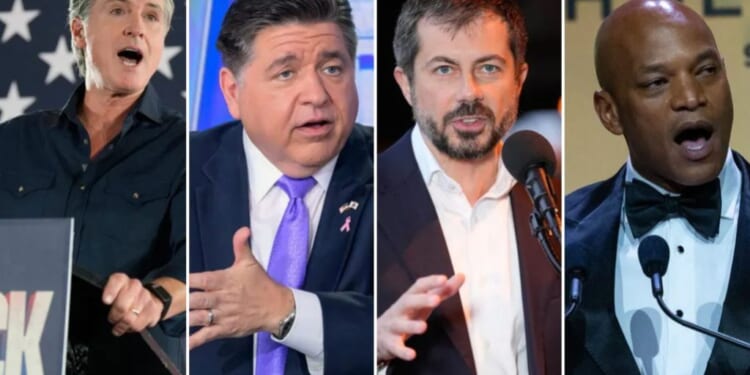Democrats eyeing the 2028 elections are using the fallout from the longest government shutdown in U.S. history to draw a sharper contrast with the party’s aging Senate leadership, unleashing unusually blunt criticism of the compromise that helped reopen the government.
California Gov. Gavin Newsom was among the first to go public with his frustration. “Pathetic,” he wrote Sunday on the social platform X in response to the vote. “This isn’t a deal. It’s a surrender. Don’t bend the knee!”
In an interview with the Associated Press, Newsom said he was “stunned” by their decision. “I thought our immune system was woken up last Tuesday with the American elections,” Newsom said. “I worry now, though, that some of my colleagues and friends in the United States Senate, some of my Democratic colleagues, just decided that we’re playing by the old set of rules, not the new set of rules, and may have rolled over a little bit.”
The force of the backlash highlights a widening split inside the Democratic Party, one that veteran strategist Jon Reinish described as “beyond frustration” and “boiled-over anger,” directed not only at the eight Senate Democrats who sided with Republicans but at Senate leadership more broadly. “It’s multi-generational,” he said, arguing that the episode underscored long-standing tensions within the caucus and contrasted sharply with what many Democrats expected after the party’s strong showing in last week’s elections.
Reinish said the age divide is impossible to ignore. “If you look at folks outside of John Fetterman who flipped their positions, many of them are of the much older generation. Two are even about to retire,” he said. He argued that Sunday’s deal handed 2028 hopefuls an opening: “Washington is the best foil of all time. Whether you’re Wes Moore or Andy Beshear or Gavin Newsom, you are running against the culture of the Washington status quo. This just handed all of them a gift.”
Illinois Gov. JB Pritzker framed the compromise the same way. “This is not a deal — it’s an empty promise,” he said on X, accusing President Donald Trump and congressional Republicans of “making healthcare more expensive for the middle class and ending it for working families,” and insisting Democrats “stand tall for affordable healthcare.”
Former Transportation Secretary Pete Buttigieg warned that families are “bracing for their health insurance bills to skyrocket — so much that some will lose coverage altogether,” and argued that “any deal that fails to address this directly is a bad deal.
Maryland Gov. Wes Moore, who has repeatedly said he is not running for president in 2028, broadened his criticism to Washington’s handling of the shutdown altogether.
“This is something that is so uniquely Washington,” Moore said on Meet the Press Now. “No state is shutting down its government. No family is shutting down their family. It uniquely highlights the poison that is Washington, D.C.” He questioned how reopening the federal government had become tied to steep healthcare cuts, saying, “I don’t know how a prerequisite for reopening the federal government is kicking people off of healthcare,” and warned that Marylanders are already seeing “real pain” from expected premium increases.
Progressives have been equally forceful. Rep. Alexandria Ocasio-Cortez (D-NY) said Democrats needed to confront both “capitulation in the Senate” and “the outright cruelty among House Republicans and the White House,” warning her party that “we cannot enable this kind of cruelty with our cowardice.” Sen. Chris Murphy, speaking at a town hall in New Hampshire on Wednesday, said “the Senate has to do better” and acknowledged “some hard conversations ahead of us” after Democrats splintered.
Democratic Governors in red and purple states, however, are navigating the moment with more caution. Kentucky Gov. Andy Beshear avoided joining the intraparty pile-on, declining to criticize the Senate Democrats who backed the deal and instead focusing entirely on Republicans. In a video posted Thursday, he said congressional GOP lawmakers were “unwilling to do anything to lessen the cost of your healthcare,” and accused President Donald Trump of being “willing to let our people start to go hungry simply for political leverage.”
Pennsylvania Gov. Josh Shapiro struck a similar posture. In a Nov. 7 speech, delivered before the shutdown deal was finalized, he delivered an emotional denunciation of Republicans’ efforts to block SNAP benefits. He blasted JD Vance as “a total phony” who “turned his damn back” on the same Appalachian families he wrote about in his memoir. Citing scripture, Shapiro said leaders have a duty “to feed the hungry,” adding that “America deserves better than JD Vance.”
Another Democratic strategist, Brad Bannon, said the fury is part of a predictable and overdue generational realignment. “A large majority of Democratic primary voters thought it was a bad deal,” he said. “There’s a split now between younger progressive Democrats and older establishment Democrats. What happened in the Senate is going to widen that split and encourage more primary challenges.”
He said these clashes follow a familiar pattern in modern American politics. “This happens once every 30 years,” Bannon said. “Baby boomers are fighting to retain their power, and younger millennials and Generation Z Democrats are fighting to take it away from them. It’s a changing of the guard that’s inevitable.”
As for whether it’s risky for Democrats to attack members of their own party openly, Bannon said the criticism will ultimately benefit them. “In the long run, this is going to be good for Democrats,” he said. “Voters are hostile to Washington and the establishment. It’s good for the party to have more anti-establishment voices.”
CENTRIST DEMOCRATS WARN AGAINST RISE OF PARTISANSHIP IN CONGRESS AFTER BACKING DEAL TO END SHUTDOWN
Both strategists said the tension is unlikely to fade quickly. “Not even a week before, a blue wave swept across the country and Democrats had an incredibly good night,” Reinish said. “Only to be disappointed once again by Senate Democrats.”
Bannon said the shutdown vote could push more older lawmakers toward retirement ahead of 2026 and 2028. “The Democratic Party needs fresh voices, and voters want younger leadership,” he said. “This is going to be a recurring theme.”















